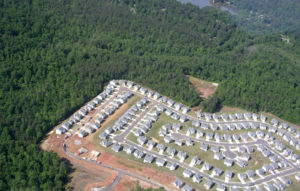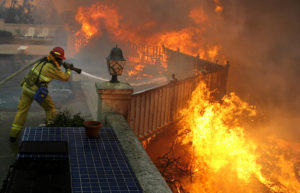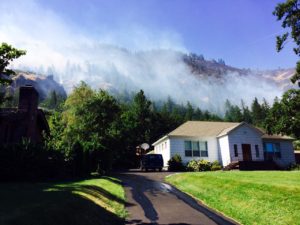I spend about half my time camping on National Forest lands and half in or near a city. My last sojourn into the wilderness lasted about a month. So, I was not surprised that I accumulated a wild roommate.
I met my mouse along the St. Joe River while I was packing up in preparation for the trip to Spokane, when he jumped out of the camp chairs I had set along the camper. I don’t really mind mice if they are behaving, and this little guy was just exploring (later I learned he chewed a hole in a towel). He was so cute too. I said a few words to him about not settling into the camper and he seemed to hear me as he ran underneath.
Now, before I pulled away from the fall-tinged river valley, I put my half-full coffee percolator in the oven so it would not spill as I drove over bumpy roads. I like the leftover coffee after lunch. I headed towards Spokane on back roads that passed by golden hills with scattered clumps of towering evergreens. I picked up coffee at a little store that afternoon and forgot about the pot in the oven.
When I settled into my RV park, I decided to cook dinner in the oven (yes, this is getting gross so don’t continue if you are squeamish). I lit the oven and while it heated I prepared my food. When I opened the oven door I noticed the coffee pot was still there, so I took out the steaming pot and put dinner on the wire rack instead. As I grabbed the coffee pot to clean it, in a moment that turned slow-motion, I noticed that the pot was heavier than usual. Then, I saw him. My cute little mouse was simmering in the hot coffee. In one surrealistic moment, I tossed the mouse and coffee over the fence and put the coffee pot in the trash. Shiver. Gross. My little wilderness mouse fell hard as he tried to adapt to life in civilization. Either that or he was a caffeine addict.
 There are plenty of mice in the world; I do not believe that my murder of just one will put them on the endangered species list. I thought, though, about the bigger animals that die as city people and their homes sprawl into natural settings. I encountered a new term recently: wildland-urban interface, which describes the transition zone between unoccupied land and developments. In western states, 38% of all new development takes place in this interface, creating what some call boomburbs. Think sprawling new subdivisions built on former farmland and McMansions on heavily forested lands. Also prevalent in the wildland-urban interface: new bypass roads, recycling facilities, new golf courses, park and ride sites, airports, large hospitals, big box stores. The areas are still open and partly agricultural, but the homes march in at a rapid pace.
There are plenty of mice in the world; I do not believe that my murder of just one will put them on the endangered species list. I thought, though, about the bigger animals that die as city people and their homes sprawl into natural settings. I encountered a new term recently: wildland-urban interface, which describes the transition zone between unoccupied land and developments. In western states, 38% of all new development takes place in this interface, creating what some call boomburbs. Think sprawling new subdivisions built on former farmland and McMansions on heavily forested lands. Also prevalent in the wildland-urban interface: new bypass roads, recycling facilities, new golf courses, park and ride sites, airports, large hospitals, big box stores. The areas are still open and partly agricultural, but the homes march in at a rapid pace.
The short-term impact on humans living in the interface is primarily the exposure to nearby wildfires and in some cases, susceptibility to flooding as we saw in Houston. Our government spends millions trying to save fancy homes, but the impact on regional animals due to human sprawl is of greater significance to me. Cars and trucks kill animals crossing the interface roads. Developments displace bears, wolves, and large cats, and if they venture too close to the sprawl, they will likely be caught and killed.
City planners are now considering better ways to manage the interface. The US Forest Service is also on the management bandwagon. Montana has already mapped its wildland-urban interfaces and my adopted home state of NM is taking the issue seriously.
England and other European countries are actually the leaders in tackling the land management issues with gusto. I stand with American scientist E.O. Wilson who recommends setting aside half of the world’s ecosystems to support a healthy planet. I believe also, development on all wildland-urban interface lands should be banned.
Of course, compromises will be needed in the end; now is the time to wake-up and realize that this is not an irrelevant matter. It is amazing to me, in liberal Washington State, how many of the wildland-urban interface developments are populated by affluent folks who own electric cars, shop for organic foods, and hike on the weekends, yet have no clue about the impacts of their encroachment on wild lands. We need a heavy dose of public awareness.




Thanks for sharing this piece
You are welcome, thanks for coming by!